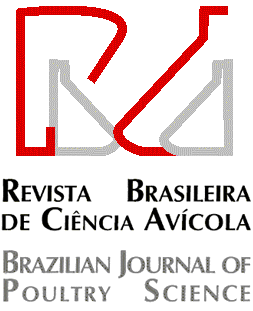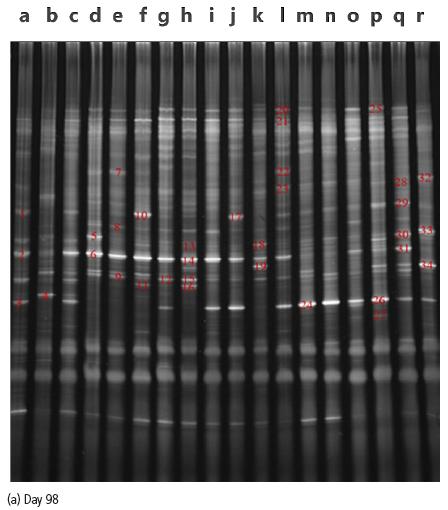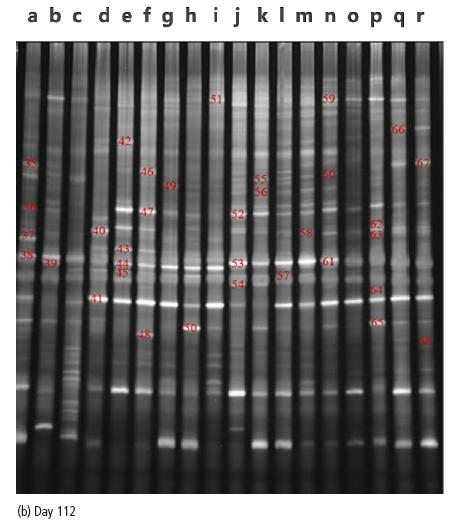| Stripe number |
Sequence length (bp) |
The closest name of the spawn in the GenBank database (login number) |
Similarity % |
| 1 |
171 |
Ruminococcuslactaris ATCC 29176 Scfld_02_7(NZDS990170.1) |
99 |
| 2,15,20,25,31 |
170 |
[Clostridium] saccharolyticumstrainAn168contig_53 (NZNFKU01000053.1) |
100 |
| 3 |
190 |
Alistipessenegalensis JC50 (NZCAHI01000040.1) |
97 |
| 4,13,24,26,35,41,51,55,68 |
191 |
Bacteroides uniformis ATCC 8492 Scfld_3.0.1_32(NZ_DS362249.1) |
99 |
| 5 |
171 |
Helicobacter pullorum MIT 98-5489 supercont2.11 (NZDS990451.1) |
100 |
| 6,10,11,14,17,30 |
191 |
Alistipestimonensis JC136 strain DSM 25383 (NZFNRI01000015.1) |
97 |
| 7,62 |
172 |
Stomatobaculumlongumstrain ACC2 supercont1.5 (NZJH590865.1) |
87 |
| 8,9 |
172 |
Hathewayaproteolytica DSM 3090(NZ_FRAD01000002.1) |
89 |
| 12,27 |
191 |
Alistipesinopsstrain 627 contig00044(NZ_JRGF01000044.1) |
97 |
| 16 |
197 |
Selenomonasruminantiumstrain WCT3(NZFNCM01000034.1) |
93 |
| 18 |
170 |
Coprococcus comes ATCC 27758 Scfld1(NZGG662006.1) |
99 |
| 19 |
173 |
[Clostridium] termitidis CT1112 Ct_contig00106(NZAORV01000077.1) |
93 |
| 21 |
172 |
Acholeplasmaequifetale ATCC 29724 T434DRAFT_scaffold00026.26_C(NZJHXL01000026.1) |
79 |
| 22 |
174 |
Intestinimonasbutyriciproducensstrain AF211(NZCP011307.1) |
94 |
| 23,28 |
171 |
MerdimonasfaecisstrainBR31_L001_R1_001_paired_contig_46 (NZMIEH01000046.1) |
100 |
| 29 |
172 |
[Clostridium] papyrosolvens DSM 2782 ctg56 (NZACXX02000011.1) |
90 |
| 32 |
191 |
Butyricicoccuspullicaecorum 1.2 acBRa-supercont1.4 (NZKB976106.1) |
99 |
| 33,34 |
171 |
Terasakiellapusilla DSM 6293 Q397DRAFT_scaffold00068.68_C(NZJHYO01000068.1) |
89 |
| 36 |
190 |
Olivibactersitiensis DSM 17696 A37SDRAFT_scaffold_13.14_C(NZ_ATZA01000014.1) |
83 |
| 37 |
191 |
Leeuwenhoekiella sp. MAR_2009_132 P164DRAFT_scf7180000000008_quiver.2_C(NZJPOL01000002.1) |
90 |
| 38,48 |
174 |
Intestinimonas sp. GD2 genomeassemblyIntestinimonasmassiliensis, scaffold00006 (NZLN869528.1) |
91 |
| 39,50,53,56,61,65 |
191 |
Arenibacteralgicolastrain TG409 U735DRAFT_scf7180000000011_quiver.3_C (NZJPOO01000003.1) |
90 |
| 40 |
192 |
Bacteroides coprophilus DSM 18228=JCM 13818 strain DSM 18228 Scfld2 (NZEQ973630.1) |
100 |
| 42 |
191 |
Prevotelladentasini JCM 15908 (NZBAKG01000039.1) |
94 |
| 43 |
170 |
Alistipesfinegoldii DSM 17242, complete genomeSequence ID:(NC018011.1) |
99 |
| 44,46,52 |
190 |
Bacteroides stercoris ATCC 43183 Scfld_02_15 (NZ_DS499676.1) |
94 |
| 45 |
197 |
Desulfitobacterium dichloroeliminans LMG P-21439 (NC019903.1) |
89 |
| 47 |
191 |
Parabacteroides johnsonii CL02T12C29 supercont1.5 (NZJH976469.1) |
93 |
| 49 |
172 |
Ruminococcusbicirculans chromosome II (NZHF545617.1) |
88 |
| 54 |
191 |
Odoribactersplanchnicus DSM 20712 (NC015160.1) |
92 |
| 57 |
173 |
Oscillibacter sp. KLE 1745 Scaffold82 (NZKI271778.1) |
97 |
| 58 |
191 |
Parabacteroides distasonis ATCC 8503 (NC009615.1) |
95 |
| 59 |
191 |
Bacteroides coprocola DSM 17136 Scfld_02_75 (NZDS981502.1) |
95 |
| 60 |
191 |
Rikenellamicrofusus DSM 15922 RikmiDRAFT_RMD.2 (NZ_KE386488.1) |
97 |
| 63 |
171 |
Tyzzerellanexilis DSM 1787 Scfld665 (NZDS995667) |
99 |
| 64 |
191 |
Coprobacterfastidiosus NSB1 scaffoldcontig19 (NZKI440788.1) |
92 |
| 66 |
191 |
Bacteroides ovatus strain ATCC 8483 (NZCP012938.1) |
92 |
| 67 |
174 |
Elusimicrobiumminutum Pei191 (NC010644.1) |
92 |

 1CON=thermoneutraltemperature control group (basal diet,28±1°C), HS=heat stress control group (basal diet, 38±1°C), ANT=antibiotic group (basal diet supplemented with 5 mg/kg flavomycin, 38±1°C ), FVS=FVS group (basal diet supplemented with 20, 40 or 60 g/kg FVS, 38±1°C).2The number presented inside the figure is the stripe number.3a-c=CON group, d-f=HS group, g-i=ANT group, j-l=20 g/kgFVS group, m-o=40 g/kg FVS group, p-r=60 g/kg FVS group.
1CON=thermoneutraltemperature control group (basal diet,28±1°C), HS=heat stress control group (basal diet, 38±1°C), ANT=antibiotic group (basal diet supplemented with 5 mg/kg flavomycin, 38±1°C ), FVS=FVS group (basal diet supplemented with 20, 40 or 60 g/kg FVS, 38±1°C).2The number presented inside the figure is the stripe number.3a-c=CON group, d-f=HS group, g-i=ANT group, j-l=20 g/kgFVS group, m-o=40 g/kg FVS group, p-r=60 g/kg FVS group.
 1CON=thermoneutral temperature control group (basal diet,28±1°C), HS=heat stress control group (basal diet, 38±1°C), ANT=antibiotic group (basal diet supplemented with 5 mg/kg flavomycin, 38±1°C), FVS=FVS group (basal diet supplemented with 20, 40 or 60 g/kg FVS, 38±1 °C).2#1-#3=CON group, #4-#6=HS group, #7-#9=ANT group, #10-#12=20 g/kg FVS group, #13-#15=40 g/kg FVS group, #16-#18=60 g/kg FVS group.
1CON=thermoneutral temperature control group (basal diet,28±1°C), HS=heat stress control group (basal diet, 38±1°C), ANT=antibiotic group (basal diet supplemented with 5 mg/kg flavomycin, 38±1°C), FVS=FVS group (basal diet supplemented with 20, 40 or 60 g/kg FVS, 38±1 °C).2#1-#3=CON group, #4-#6=HS group, #7-#9=ANT group, #10-#12=20 g/kg FVS group, #13-#15=40 g/kg FVS group, #16-#18=60 g/kg FVS group.
